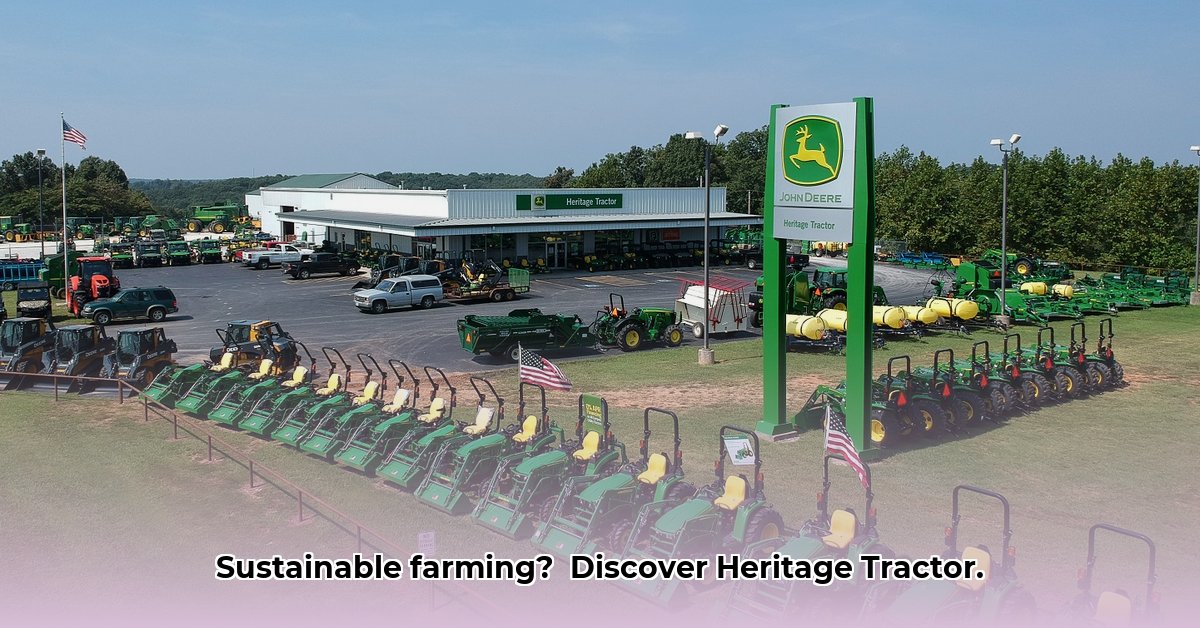
Heritage Tractor's Role in the Lamar, MO Agricultural Community
Nestled in Lamar, Missouri, Heritage Tractor is more than just a John Deere dealership; it's a cornerstone of the local agricultural community. Their influence extends beyond the sale of tractors and combines; they actively contribute to a more sustainable and productive farming landscape. This case study explores Heritage Tractor’s impact on sustainable agriculture in Lamar, highlighting their contributions, analyzing the challenges of quantifying their sustainability efforts, and proposing future improvements. Sustainable farming, focusing on environmentally responsible practices that minimize negative impacts while maximizing long-term productivity, is increasingly crucial for the future of agriculture. For a look at other agricultural history, check out the Perryville Tractor Museum.
Heritage Tractor stocks a diverse range of John Deere machinery, catering to both small, environmentally conscious farms and larger operations. This ensures access to efficient and potentially sustainable tools for farmers of all scales. But their impact reaches far beyond equipment sales.
Community Engagement and Indirect Contributions to Sustainability
Heritage Tractor's commitment to the Lamar community extends beyond business transactions. Events like their annual Farm Safety Day and the fun Trick-or-Tractor gathering aren't merely social occasions; they are vital opportunities for community building and knowledge sharing. These events foster a supportive network among local farmers, encouraging best practices that enhance both productivity and environmental stewardship. Improved safety practices, for example, directly contribute to reduced fuel waste and improved resource management. While difficult to quantify directly, these indirect contributions are significant.
Quantifying the Impact: A Challenge Shared Across the Industry
Accurately measuring Heritage Tractor's direct contribution to sustainable agriculture presents a significant challenge. Precise data on fuel efficiency across all sold equipment, the dealership's overall carbon footprint, and waste management practices are currently unavailable. This difficulty isn't unique to Heritage Tractor; quantifying the environmental impact of individual businesses within the agricultural sector remains a complex task for researchers and industry stakeholders.
However, the potential for positive impact is undeniable. Providing fuel-efficient equipment likely reduces overall fuel consumption and emissions for farmers. The community engagement initiatives almost certainly improve safety awareness and farming practices, leading to better resource management. While precise figures are lacking, the positive influence of Heritage Tractor’s actions is highly probable.
Opportunities for Enhancing Sustainable Practices: A Collaborative Effort
Heritage Tractor, local farmers, and the wider Lamar community can work together to enhance sustainable agricultural practices. Several key steps can be taken:
For Heritage Tractor:
- Comprehensive Carbon Footprint Assessment: A detailed assessment of the dealership's operations and the environmental implications of the equipment sold would offer a clearer picture of their impact and highlight improvement areas.
- Transparency Through Reporting: Publishing a public sustainability report would showcase their efforts and enhance transparency, building trust with customers and the community.
- Promoting Sustainable Technologies: Actively promoting the sale and use of John Deere's fuel-efficient and environmentally friendly equipment would directly support more sustainable farming practices.
- Renewable Energy Adoption: Transitioning to renewable energy sources for dealership operations would demonstrate leadership and reduce their environmental footprint.
For Local Farmers:
- Equipment Modernization: Investing in more fuel-efficient and sustainable equipment can greatly reduce environmental impact and increase productivity.
- Utilizing Educational Resources: Fully utilizing resources like Farm Safety Day can significantly improve farming practices and resource management.
- Exploring Incentives: Investigating government grants and other incentives for sustainable farming practices can help offset costs and encourage adoption.
For the Lamar Community:
- Supporting Local Food Systems: Supporting local farmers' markets and initiatives that emphasize locally-grown, sustainable food fosters a healthier community and stronger local economy.
- Advocating for Change: Encouraging policies that support sustainable agriculture at local and national levels is crucial for long-term environmental health.
Navigating Risks and Opportunities: A Path to Sustainable Success
Heritage Tractor's long-term success depends on proactively addressing potential risks and seizing opportunities. A proactive approach to sustainability is crucial for navigating the evolving agricultural landscape.
| Risk Factor | Probability | Impact | Mitigation Strategy |
|---|---|---|---|
| Failure to adapt to sustainable trends | Medium-High | High | Proactive research and development; industry collaborations; staying informed about new sustainable technologies. |
| Negative perception from lack of transparency | Medium-High | Medium | Open communication about sustainability efforts; actively seeking community input. |
| Increased competition | Medium | Medium | Differentiation through community engagement and commitment to local farmers; offering specialized services. |
| Equipment malfunctions | Low | High | Robust quality control and training; proper maintenance and repair services; clear information on equipment use and disposal. |
Conclusion: A Shared Commitment to a Sustainable Future
Heritage Tractor plays a vital role in shaping the future of agriculture in Lamar, Missouri. Their commitment to community engagement and providing modern, fuel-efficient equipment contributes significantly to the environmental health and economic prosperity of the region. While fully quantifying their sustainability impact is an ongoing process, their positive influence is already evident. Their journey toward comprehensive sustainability is critical for the future of agriculture in Lamar and beyond, representing a shared commitment to a more responsible and successful agricultural future.